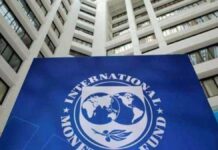
ISLAMABAD: In order to reach a staff-level agreement with the International Monetary Fund (IMF), Pakistan will require to bring down its borrowings from the central bank to nil from Rs3.8 trillion, jack up electricity tariff by up to 30%.
This would also include the inclusion of integrated value-added tax (VAT) for bringing both goods and services under uniform tax collection agency, reports an English daily.
To reduce its borrowing from the State Bank of Pakistan to nil, the government will have to affirm to reduce borrowings on a quarterly basis and the dependence for it will transfer to commercial banks instead.
If these measures are adopted, the central bank will cause an increase in interest rate, since SBP has already raised policy rate by 450 basis points in the last year to 10.25% from 6.75%.
According to official sources, the IMF will demand to attain a primary balance of budget into surplus, which is presently seeing a huge deficit.
The primary budget deficit which doesn’t include interest payment has been determined at negative 2.2% of gross domestic product (GDP) based on last year’s fiscal data.
And the Washington-based lender is seeking to convert this deficit into a surplus, hence the incumbent government will require to make a fiscal adjustment of 1.1% of GDP each in the next two years akin to what IMF got enforced in case of Egypt’s $12 billion package.
To attain fiscal consolidation under the demand of converting the primary balance of budget deficit into a surplus, the government will require to slash grants and subsidies including the development programme.
The Pakistan Tehreek-e-Insaf already slashed the size of the Public Sector Development Programme (PSDP) in September last year and now the focus could be moved towards eliminating vertical programmes such as population welfare and other in its entirety from the realm of the federal government to provinces.
However, funding for Benazir Income Support Programme (BISP) would be secured in order to ensure safety nets for unprotected segments of society that could be severely jeopardized in the wake of adjustment programme under IMF demands.
And BISP programme may undergo shift on a cost-sharing basis of 50:50 percent by the federal and provincial governments.
Under IMF conditions, the existing general sales tax (GST) regime will be replaced with VAT. At present, GST on goods falls under the purview of the federal government, whereas GST on services falls in the domain of provinces.
Regarding the increase in power tariff, the officials shared the government will have to explore different options for managing the ongoing cash bleeding of the power sector.






